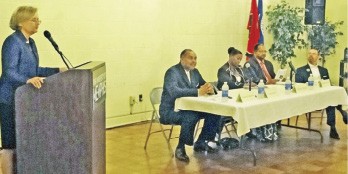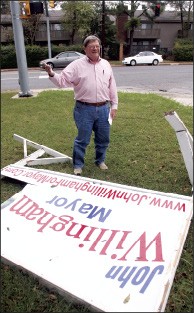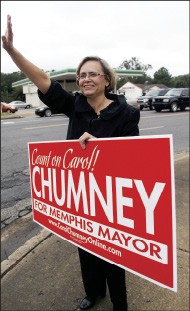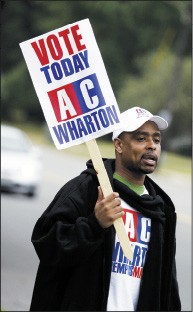Where’s A C? By last week it was a ritual phrase in the campaign
— persistently intoned by Shelby County mayor A C Wharton’s
opponents at a variety of scheduled forums and debates to size up the
candidates for Memphis mayor.
Many of these affairs were well-attended — like the one
sponsored by several organizations and held in the Raleigh-Frayser
area, or another one held in Cordova under the auspices of the Cordova
Leadership Council. Others were held before smaller, specialized
audiences, like last week’s “green” debate at the University of
Memphis.
Mayor Pro Tem Myron Lowery was a regular at these events, as were
former City Council member Carol Chumney, current councilwoman Wanda
Halbert, and municipal bonds lawyer Charles Carpenter. Kenneth T.
Whalum Jr., a school board member and pastor of New Olivet Baptist
Church, was generally available, too, and a rotating cast of others
would check in: former county commissioner and perennial candidate John
Willingham, parks services employee Detric Stigall, or W.W.E. eminence
Jerry Lawler.
There are 25 names on the ballot overall. Some of them are well
known, like E.C. Jones, the former councilman whose decision to file
seemed to be a spontaneous emotional reaction to the sentencing of his
son Chris in a murder case, or Silky Sullivan, the Beale Street
restaurateur, or Robert “Prince Mongo” Hodges, the eternal
self-professed space alien whose act, like his eccentric wardrobe, has
a moldy look to it.
There are other names that tug at most people’s peripheral memory,
like perennials Johnny Hatcher and Mary Taylor-Shelby Wright (notorious
most recently for throwing water on her own lawyer in a courtroom) and
David Vinciarelli, still hopeful of getting a leg-up in some election
or another. There also are unknowns whose names conjured up parlor
games, like Leo Awgowhat (Knock knock/Who’s there?/Awgo/Awgo
who?) or the alliterative Vuong Vaughn Vo.
And there is at least one case — that of school board member
and former Charter Commission member Sharon Webb — of someone’s
losing a hold on identity in the very act of running. Webb’s dazy
know-nothingism outpointed even Mongo’s show-off rap for irrelevance in
the first showcase event of the special-election season, a late-August
debate on WMC-TV Action News 5.
That first TV debate also was the event that foreshadowed Wharton’s
intention to remain as elusive as possible, holding his participation
in group situations to the barest minimum while stage-managing
occasions that presented him on his own terms.
Take his “Sustainable Shelby” program, rolled out last month in a
public ceremony with the same kind of fanfare that had greeted such
other grand thematic approaches to problems as his Smart Growth
initiative of the mid-2000s and Operation Safe Community, which
addressed crime.
All well and good, but Sustainable Shelby dealt with environmental
questions in the macro manner. And, while nobody doubted that Wharton
knew his stuff on this issue as on most else that he might be asked
about, he was not on the scene last week at the University of Memphis
for a forum on green issues and therefore could not (or would not) mix
it up — either with his opponents or, potentially, with
questioners in his audience.
Beyond the matter of subjecting himself to barbs thrown by rivals
desperate to trip him up, Wharton also declined thereby to deal with
the specifics presented by other candidates. That night there was, as
always in forums of that sort, a certain amount of blather and sleight
of hand, in which the candidates dressed up their existing hobby horses
in green embroidery so as to pass muster as genuine environmentalism.
(Carpenter’s all-purpose “comprehensive plan” was so bedecked, as was
Whalum’s idea of dispersing city-government offices into
neighborhoods.)
 Jackson Baker
Jackson Baker
Candidate Carol Chumney takes the podium at the University of Memphis ‘green’ forum.
But there were also intriguing suggestions: Lowery’s for a monorail
system circling the city; Halbert’s for a return to cooking in school
cafeterias (instead of thawing and reheating pre-packaged products);
Chumney’s touting of gardens in vacated areas; Whalum’s call for the
Memphis Area Transit Authority to develop a bike-rental arm; and
Carpenter’s call for a thorough revamping of MATA’s antiquated
routes.
And it would have been interesting — and perhaps revealing
— to see how Wharton (whose knowledge of the general subject area
no one doubts) might improvise and ad-lib along with the others.
Long, tall, focused, and whip-smart — adjectives that could
also have once described former mayor Herenton, on whose coattails he
would come into prominence — Carpenter will likely not make it
this time around, but don’t discount him for 2010, when there’s a race
for county mayor, or in 2011, when there’s another one for city
mayor.
As he has so often noted on the stump, Carpenter is a home-grown
product, having ascended from humble beginnings in the downtown area to
get himself through Howard University and Notre Dame Law School. As he
so often has said, he came back home to find nobody wanted him, so he
hung out his own shingle. He already was on the rise, but his coming
aboard candidate Herenton’s campaign as its manager in 1991 allowed
him, after the upset win of the first elected black mayor in Memphis,
to apply his talents to large-scale urban projects, and his general law
practice rapidly escalated into one specializing in municipal financing
— a latter-day example of which involved bringing the FedExForum
project to fruition.
 Justin Fox Burks
Justin Fox Burks
John Willingham checks on vandalized campaign signs on the corner of Colonial and Park.
His close association with Herenton is definitely of the
for-better-or-for-worse variety. Carpenter has disclaimed any
involvement in policy-making, and he notes that Wharton ran almost as
many of Herenton’s election campaigns as he did. He wants, he has
persistently said, to transition city government “from a political
culture to a business culture” and has meanwhile concentrated his
efforts on the larger Whitehaven area.
Carpenter’s public positions sometimes bespoke not only his
inner-city roots but his past relationship with Herenton, as if
unwittingly. Take his rejection of city/county consolidation, delivered
to several hundred attendees at the Breath of Life Christian Center in
Raleigh on September 21st: “I think this is one of the biggest
back-room deals in Memphis history,” he declared. After summarizing the
current plan as one in which the suburbs would retain their independent
schools and their municipal governments, while Memphis would dissolve
its separate governing institutions, Carpenter declared, “Let’s look at
the timing of all of this. Former mayor Willie Herenton has been
talking about consolidation for a decade. Nothing happens. He’s out of
office for 60 days, and there’s a plan!”
Back again for a second try at city mayor (she has also run once for
the county’s top job) is Carol Chumney, Herenton’s runner-up in 2007. A
veteran, as she invariably points out, of 17 years in public service
(13 as a state representative from Midtown, four as council member),
Chumney has succeeded to some degree in linking her public image to
what she perceives as the public’s desire for reform.
That goes even for her appearance. Gone is the sensible-shoes look
of 2007, her first try at city mayor. Some 30 pounds lighter and
considerably more fashionable in appearance, she is the would-be
leading lady of change in 2009. But she has been hampered.
Beyond the fact of her difficulty in raising money, Chumney
possesses two additional handicaps that did not exist for her in 2007,
when, in what amounted to a tripartite race with Herenton and former
MLGW head Herman Morris, she finished a strong second with 35 percent
of the vote, versus 42 percent for Herenton.
Two years ago, Chumney’s name was a household word. As an active
member of the council, she had stood out for her iconoclasm in all
matters and was among the first to challenge the infamous — and
soon discontinued — 12-year-and-out city pension arrangement. Her
talent was in finding the flaws in the usual. And, though she
challenged her fellow council members as often as she did the
administration, she had Herenton, whose reputation was in steep
decline, to kick around, and he made an admirable foil.
There was something retro and unconvincing about her pledge in this
year’s mayor’s race to “fight for you.” The slogan was appropriate for
a legislator, especially one who made a point of not going along to get
along. But it had an unduly reactive sound in the mouth of a potential
chief executive, whose charge was to lead — not to kick against
the pricks, as it were, but to coax them to come along.
 Justin Fox Burks
Justin Fox Burks
Carol Chumney waves to passing cars at the corner of Park and Mt. Moriah.
Wanda Halbert, a first-term council member who served two terms on
the city school board, was a surprise entry for mayor, and she has been
woefully underfinanced, but she has been a dutiful candidate,
schlepping into as many open arenas and public forums as possible and
declaiming there an often detailed and quasi-revolutionary attitude
toward government.
Almost as persistently as Carpenter, she has noted what she
considers an injustice in the system — a preference, as she sees
it, for bestowing benefits on corporations and management firms rather
than on neighborhoods and the people who live in them. She is like
Carpenter, too, in calling for what they both call “tax equity,” a
revision of the relationship between city and county in which, they
both say, inner-city residents end up paying for their richer neighbors
of the county suburbs via a dual system of taxation.
The Rev. Kenneth Whalum Jr. has been nothing if not entertaining.
And his repetition of simple ideas in concrete terms is refreshing:
Restore Libertyland. Fire the “400 appointees” of the former mayor.
Disperse city offices into the neighborhoods. Lease office space in the
Pyramid to newly licensed doctors and lawyers on the proviso that,
within a set period of time, they, too, would hang their shingles in
neighborhoods. But, for all of the 83,939 votes he had won in his
at-large school board race, there was little sign that he had tapped
into a citywide groundswell.
“K.T. is running for City Council in 2011. You can count on it,”
said one of his rivals late in the game.
Perhaps that was too limiting. The charismatic pastor of New Olivet
Baptist Church could remain a vocal maverick on the school board, and
it was easy to imagine him mounting up for a serious challenge to
whoever would be the incumbent in 2011 — especially someone like
Wharton, whom he could clearly brand an establishmentarian.
I still wonder what might have happened if Jerry Lawler had done
some serious campaigning. Like Chumney, whose first and most serious
splash in a mayoral contest is evidently not to be repeated this time
around, Lawler’s first foray, in 1999, might have been his high-water
mark.
Granted, he only got 12 percent of the vote that year, but that,
too, was a multi-candidate race, with some serious big-name candidates
in it, in addition to the then still popular and high-flying incumbent
Herenton. And he had been restricted by a week-long schedule of
wrestling obligations from doing much in the way of campaigning.
This year, as he repeatedly said, his duties with the W.W.E. were
restricted to one night a week (Monday) on which he would fly to a
different American city, where he was responsible for some televised
wrestling commentary. Period. End of story. The rest of the time he
could devote himself to campaigning — though it would not be of
the conventional sort. After all, he was “no politician.” (A disclaimer
adopted also by Carpenter.)
Even so, Lawler should have given himself more of a chance to make
more elaborate sense of some of the issues: The Pyramid. Going green.
Urban blight and sprawl. As it was, he spoke in bromides: Allow people
to keep more of their money. Cut waste. Bring government to the people.
All well and good, and some, or all of it, was echoed by others.
 Justin Fox Burks
Justin Fox Burks
Ray White campaigns for A C Wharton at the early voting station inside the Church of Christ on Colonial near Dee.
Late in the campaign — just this week, in fact — Lawler
hitched himself to an unlikely star, an education initiative chaired by
an ensemble including Al Sharpton and Newt Gingrich, two figures
unlikely to resonate anywhere, much less in a race for Memphis mayor.
However remote, however strangely authored, it was a bona fide
issue.
But essentially, all we had to go on was a man likable and
well-intentioned, intelligent, committed to Memphis, and certainly able
to do more than walk, chew gum, and sign autographs. But all of that,
and a good deal else, was spoken to by the apparent man of the hour, A
C Wharton, who, politician or no politician, was riding high in the
polls and was experienced besides.
A C Wharton is speaking in sound bites — in inaugural-sounding
snippets in TV ads which feature that famous uplifting persona of his:
“one Memphis.” Provide our police with the best technology possible. A
smiling, confident presence — one whose air of calm and
reassurance may be what the city yearns for after its 18 years of
experience with a sometimes inspiring, often abrasive Alpha male.
Here’s an odd and almost forgotten fact: When black Memphians went
looking for an exemplar to become the city’s first African-African
chief executive in 1991, the year Herenton was finally selected,
Wharton, then serving as Shelby County public defender, was an also-ran
among the contenders, generally considered to be less viable than such
other hopefuls as Otis Higgs, a judge and veteran of mayoral races, and
Shep Wilbun, then a member of the City Council and one of the
organizers of the consensus movement.
He has worn well, however, and served well on behalf of such others
as Herenton, two of whose mayoral campaigns he managed, and statewide
candidates like Congressman Jim Cooper, a candidate for U.S. senator in
1994.
He already was considered a likely city leader when he was tapped by
various establishmentarians to run for county mayor in 2002, after
two-term Republican Jim Rout, seeing evidence of strengthened
Democratic demographics, decided to step down. A C, as almost everybody
called him, was black but had crossover written all over him. His very
blandness became a virtue. Yet, when needed, he could snap to and
answer a challenge — as when he warned Governor Phil Bredesen
last spring not to interdict any federal stimulus money headed for
Memphis, then charm Bredesen into not minding, with a joke about how the news
reports must have confused one mayor whose name ended with “-ton” with
another.
And Wharton has persistently fielded doubts about his overall
achievements as county mayor by pointing out the obvious — that
the powers of that job are as circumscribed as those of the one he now
seeks are expansive.
All his major opponents have criticized Wharton, with some justice,
as having dodged the debates. “Disrespectful” is the common term of
reproach. But the polls — his own, those of opponents, and those
taken by third-party sources — have been consistent. He doesn’t
just lead the field. He has virtually lapped the others, who trail him
by anywhere from 25 to 40 points, and he is candid enough to publicly
entertain hopes of winning an outright majority (though a plurality is
all he’ll need).
All this must be more than frustrating for the other mayor in
the race — Lowery, whose 60-plus days in office as the city’s
acting chief executive have been marked by a take-charge attitude and
by specific achievements: an edict allowing beer sales (and consequent
revenues) during University of Memphis games at the Liberty Bowl; his
announcement last week of red-light cameras at key intersections, a
means whereby policing powers could be conserved while advancing
detection of traffic offenses; a whirlwind of actions taken in the name
of transparency, culminating only this week with the release of
documents demonstrating that predecessor Herenton and the ex-mayor’s
CEO, Keith McGee, had claimed what seemed to be extravagant
compensation for unspent vacation time.
Lowery’s one stumble, his frustrated attempt to fire city attorney
Elbert Jefferson within minutes of being sworn in as mayor pro tem, had
the virtue of making Lowery look bold, like someone willing to take
chances, even if it meant running afoul of a council majority. Even if,
as Lowery’s detractors contend, Jefferson, a diabetic who has been on
sick leave for the last several weeks, is essentially a scapegoat for
the sins, real and imagined, of the Herenton administration, Lowery
succeeded almost instantly in becoming the anti-Willie of this year’s
mayor’s race. That was especially the case when the outgoing mayor
spent many of his last days in office singling out Lowery as an
antagonist who had to be stopped at all costs.
A councilman since his first election in 1991, the same year
Herenton became mayor, Lowery has positioned himself over the years as
a swing man on the council and, despite a certain brusqueness,
something of a conciliator.
Arguably, he has been the most effective of all participants in the
public forums, trotting out his motto, “What the others are promising,
I have already done,” and citing chapter and verse when asked about the
issues.
Surely he knows the odds against his succeeding this time around are
great. But, though he maintained after a downtown fund-raiser last week
that he had “no plans” for either 2010 or 2011, it is hard to see how
he could avoid trying again to get his hands on the reins.
That is, if the amiable and able A C Wharton wins as expected and
gives Lowery or anybody else a ghost of a chance to do so.